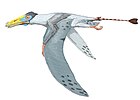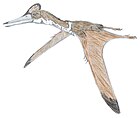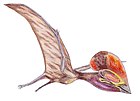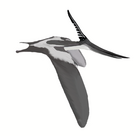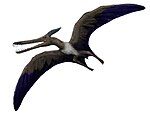Huaxiadraco
| Huaxiadraco Temporal range: Early Cretaceous,
| |
|---|---|

| |
| Holotype specimen | |
| Scientific classification | |
| Domain: | Eukaryota |
| Kingdom: | Animalia |
| Phylum: | Chordata |
| Order: | †Pterosauria |
| Suborder: | †Pterodactyloidea |
| Family: | †Tapejaridae |
| Subfamily: | †Sinopterinae |
| Genus: | †Huaxiadraco Pêgas et al., 2023 |
| Type species | |
| †Huaxiapterus corollatus Lü et al., 2006
| |
| Synonyms | |
| |
Huaxiadraco (meaning "Hua Xia [China] dragon") is a genus of tapejarid pterodactyloid pterosaur from the Aptian-age Lower Cretaceous Jiufotang Formation of Chaoyang, Liaoning, China. It is the third valid genus of tapejarid from the Jehol Biota, after Sinopterus and Eopteranodon. It contains one species, Huaxiadraco corollatus, originally assigned to the defunct genus Huaxiapterus.[1]
History of discovery
[edit]
Huaxiadraco is based on the holotype ZMNH M8131, a nearly complete skeleton. It was originally assigned to the genus Huaxiapterus by Lü Junchang and colleagues in 2006, under the binomial name Huaxiapterus corollatus.[2] Lü et al. also named another species, Huaxiapterus benxiensis, a year later.[3] However, analyses have since found that these species are only distantly related to Huaxiapterus jii,[4] the type species of Huaxiapterus, and thus require a new genus name.[5] A 2023 review of Chinese tapejarids by Pêgas et al. have confirmed these analyses, finding most of them (including Huaxipterus jii) to belong to the coeval Sinopterus dongi, although corollatus was found to belong to a distinct genus. They thus created Huaxiadraco for corollatus, synonymized benxiensis with it, and referred specimens D2525 (previously considered Sinopterus), BMPC 103, 104, and 105 to it.[1]
Classification
[edit]Based on their reassessment of the Sinopterus species-complex, Pêgas et al. modified their working dataset, previously used in the redescription of Aerotitan.[6] Their cladogram is shown below:[1]
References
[edit]- ^ a b c Pêgas, R. V.; Zhoi, X.; Jin, X.; Wang, K.; Ma, W. (2023). "A taxonomic revision of the Sinopterus complex (Pterosauria, Tapejaridae) from the Early Cretaceous Jehol Biota, with the new genus Huaxiadraco". PeerJ. 11. e14829. doi:10.7717/peerj.14829. PMC 9922500.
- ^ Lü, J.; Jin, X.; Unwin, D.M.; Zhao, L.; Azuma, Y.; Ji, Q. (2006). "A new species of Huaxiapterus (Pterosauria: Pterodactyloidea) from the Lower Cretaceous of western Liaoning, China with comments on the systematics of tapejarid pterosaurs". Acta Geologica Sinica. 80 (3): 315–326. doi:10.1111/j.1755-6724.2006.tb00251.x. S2CID 129851866.
- ^ Junchang, Lü; Yubo, Gao; Lida, Xing; Zhixin, Li; Zhenyuan, Sun (2007). "New species of Huaxiapterus from the Early Cretaceous of western Liaoning". Acta Geologica Sinica - English Edition. 81 (5): 683–687. doi:10.1111/j.1755-6724.2007.tb00992.x. S2CID 128877390.
- ^ Andres, B.; Clark, J.; Xu, X. (2014). "The Earliest Pterodactyloid and the Origin of the Group". Current Biology. 24 (9): 1011–6. doi:10.1016/j.cub.2014.03.030. PMID 24768054.
- ^ Pinheiro, F.L.; Fortier, D.C.; Schultz, C.L.; De Andrade, J.A.F.G.; Bantim, R.A.M. (2011). "New information on Tupandactylus imperator, with comments on the relationships of Tapejaridae (Pterosauria)". Acta Palaeontologica Polonica. 56: 567–580. doi:10.4202/app.2010.0057.
- ^ Pêgas, Rodrigo V.; Holgado, Borja; Ortiz David, Leonardo D.; Baiano, Mattia A.; Costa, Fabiana R. (January 2022). "On the pterosaur Aerotitan sudamericanus (Neuquén Basin, Upper Cretaceous of Argentina), with comments on azhdarchoid phylogeny and jaw anatomy". Cretaceous Research. 129: 104998. doi:10.1016/j.cretres.2021.104998. ISSN 0195-6671.



